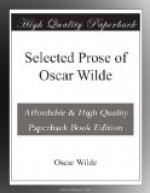WANTED A NEW BACKGROUND
He who would stir us now by fiction must either give us an entirely new background, or reveal to us the soul of man in its innermost workings. The first is for the moment being done for us by Mr. Rudyard Kipling. As one turns over the pages of his Plain Tales from the Hills, one feels as if one were seated under a palm-tree reading life by superb flashes of vulgarity. The bright colours of the bazaars dazzle one’s eyes. The jaded, second-rate Anglo-Indians are in exquisite incongruity with their surroundings. The mere lack of style in the story-teller gives an odd journalistic realism to what he tells us. From the point of view of literature Mr. Kipling is a genius who drops his aspirates. From the point of view of life, he is a reporter who knows vulgarity better than any one has ever known it. Dickens knew its clothes and its comedy. Mr. Kipling knows its essence and its seriousness. He is our first authority on the second-rate, and has seen marvellous things through keyholes, and his backgrounds are real works of art. As for the second condition, we have had Browning, and Meredith is with us. But there is still much to be done in the sphere of introspection. People sometimes say that fiction is getting too morbid. As far as psychology is concerned, it has never been morbid enough. We have merely touched the surface of the soul, that is all. In one single ivory cell of the brain there are stored away things more marvellous and more terrible than even they have dreamed of, who, like the author of Le Rouge et le Noir, have sought to track the soul into its most secret places, and to make life confess its dearest sins. Still, there is a limit even to the number of untried backgrounds, and it is possible that a further development of the habit of introspection may prove fatal to that creative faculty to which it seeks to supply fresh material. I myself am inclined to think that creation is doomed. It springs from too primitive, too natural an impulse. However this may be, it is certain that the subject-matter at the disposal of creation is always diminishing, while the subject-matter of criticism increases daily. There are always new attitudes for the mind, and new points of view. The duty of imposing form upon chaos does not grow less as the world advances. There was never a time when Criticism was more needed than it is now. It is only by its means that Humanity can become conscious of the point at which it has arrived.—The Critic as Artist.




